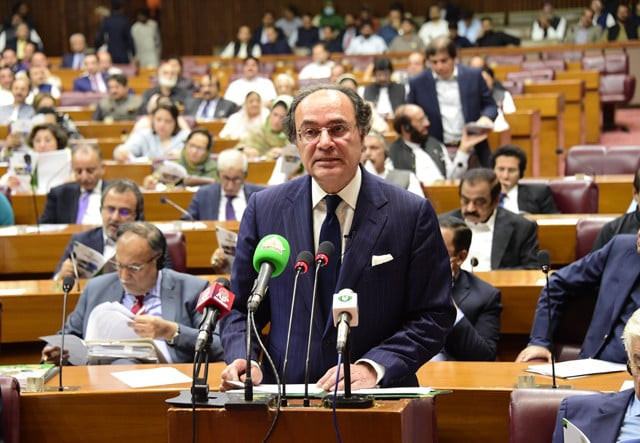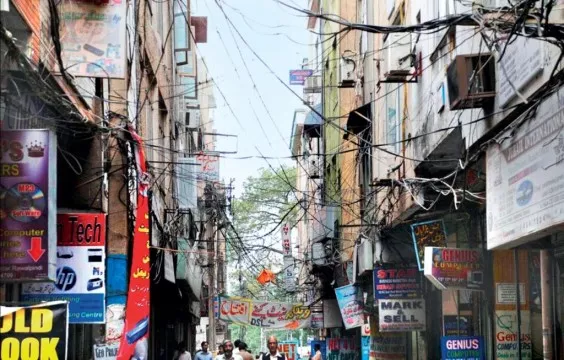Govt unveils Rs18.877 trillion budget with record development fund, salary hikes
Income tax rates increased for salaried class, with individuals earning Rs50,000 per month exempted from income tax

Federal Minister for Finance Muhammad Aurangzeb has unveiled a budget of Rs18.877 trillion for the fiscal year 2024-25, a 30% increase over the previous year.
While presenting the budget in National Assembly on Wednesday, Aurangzeb described the budget as balanced, with resources matching expenditures at Rs18.877 trillion.
On the parliament floor, Aurangzeb announced a historic development budget (PSDP) of Rs1.5 trillion. He also declared a 25% salary increase for government employees in grades 1-16 and a 22% increase for those in grades 17-22. Pensions will rise by 15%.
Minimum wages in the private sector will increase to Rs37,000 per month, up from Rs32,000 last year. Funds for the Benazir Income Support Programme will grow by 27% to Rs593 billion for FY25.
The government has also increased income tax rates for salaried individuals in the budget.
Individuals earning Rs50,000 per month will be exempt from income tax. For those earning between Rs600,000 and Rs1.2 million annually, the income tax rate has been set at 5%. This means that individuals earning up to Rs100,000 per month will now pay a monthly tax of Rs2,500, up from Rs1,250.
For annual incomes between Rs1.2 million and Rs2.2 million, the tax rate has been increased to 15%. Thus, individuals with a monthly salary of Rs183,344 will now face a monthly tax of Rs15,000, up from Rs11,667.
Incomes between Rs2.2 million and Rs3.2 million annually will be taxed at 25%. Monthly salaries of Rs267,667 will see their tax rise to Rs35,834, up from Rs28,770.
For those earning between Rs3.2 million and Rs4.1 million annually, the tax rate has been set at 30%. This means that individuals with a monthly salary of Rs341,667 will now pay a monthly tax of Rs53,333, up from Rs47,408.
Meanwhile, an income tax rate of 35% will be applied to annual salaries exceeding Rs4.1 million.
The budget presentation was marked by opposition uproar in the National Assembly.
Aurangzeb expressed gratitude to Prime Minister Shehbaz Sharif, PML-N leader Nawaz Sharif, and other coalition leaders for their guidance in preparing the budget.
"Mr Speaker, despite political and economic challenges, our progress over the past year has been impressive," Aurangzeb said, urging the nation to revitalise the economy.
He praised the government’s determination in addressing economic challenges and pledged to accelerate development under Shehbaz's leadership. He highlighted a homegrown agenda that has navigated economic difficulties and stimulated development.
Aurangzeb acknowledged hurdles such as depleted foreign reserves, a 40% rupee depreciation, stagnant growth, and soaring inflation pushing citizens below the poverty line.
He credited the previous PDM government for securing a crucial nine-month IMF programme in June 2023, which averted economic collapse.
"The previous IMF programme was ending, and a new deal was essential to prevent a default. I commend Shehbaz Sharif’s government for their efforts," he said.
Aurangzeb noted improvements in economic indicators, attributing these successes to the efforts of the PM and his team.
"Inflation stood at 11.8% in May, a notable achievement considering the challenges. We’re on the right track, and inflation is likely to decrease further," he said.
He highlighted bolstered foreign exchange reserves and growing international investor interest. He applauded the State Bank's decision to cut interest rates to combat inflation, congratulating Shehbaz Sharif and his team.
"These achievements are not ordinary. As a result, the country has exited a difficult time," he said.
Aurangzeb emphasised patience and collective effort for sustainable economic development, cautioning that progress cannot be accelerated overnight.
"There is a need for patience and extreme hard work, combined with homegrown corrective plans. The public must work together with institutions to achieve our economic goals," he said.
Aurangzeb highlighted several key measures and reforms. The FBR’s tax policies and digitisation efforts have registered 3,400 retailers, with PM Shehbaz Sharif closely monitoring these initiatives.
He pointed out that Pakistan's tax-to-GDP ratio is very low and requires reforms, with the federal government collaborating with provincial governments for fiscal stability.
The government is introducing pension reforms to save Rs45 billion and has approved right-sizing in PWE, which has been closed. A high-level committee will examine the government's structure and provide recommendations in two and a half months.
State units like PIA and the Roosevelt Hotel will be privatised to promote the private sector, with Rs622 billion in liabilities transferred from PIA's balance sheet to a holding company set up in March 2024. Major airports, starting with Islamabad International Airport, will be outsourced by July 2024.
The BISP funds will be raised by 27%, with 500,000 new households included in the programme.
Aurangzeb noted Rs5 billion allocated for an agriculture mark-up scheme, with financing to boost the sector, which constitutes 24% of GDP.
The energy sector will receive Rs253 billion, focusing on reducing losses and promoting wind and solar power. Efforts are underway to freeze debt from power reforms and involve the private sector.
The IT sector will receive Rs79 billion, with plans for an IT park in Karachi and efforts to increase exports to $3.5 billion this year.
A national digital commission will be introduced to advance digital solutions. The social welfare and education sectors will see Rs206 billion allocated for water resources, Rs8 billion for an IT park in Karachi, and Rs206 billion for drinking water projects.
Smart screens, tablets, blended learning, and e-libraries will be provided in schools, with six-month IT courses offered to students.
Overseas Pakistanis will be facilitated in sending remittances, with Rs90 billion allocated for this purpose, recognising their crucial role in the economy.
Aurangzeb presented a positive economic outlook, expecting 3.6% growth in the next fiscal year and keeping inflation around 12%. Significant allocations include defence (Rs2,015 billion), pensions (Rs1,014 billion), and power sector subsidies (Rs1,363 billion).
Efforts are being made to attract global climate finance and improve Pakistan's economic growth through a homegrown reform agenda. The PSDP allocation of Rs1,500 billion will focus on infrastructure, social sector development, and strategic projects.
In FY25, Rs50 billion has been earmarked for the production sector, with a comprehensive Karachi package introducing special projects for Karachi, Hyderabad, Sukkur, and Benazirabad.
The tax-to-GDP ratio will be increased through economic digitisation and a progressive tax system. The undocumented economy will be brought under the tax net through digitisation, with the FBR introducing personal income tax reforms.
The government is committed to facilitating exporters, recognising exports as the economy's backbone. Different tax slabs have been implemented for filers and non-filers, with a capital gains tax fixed at 15% for filers and up to 45% for non-filers.
Sales tax exemptions on many products will be reduced or eliminated, with an 18% sales tax imposed on mobile phones and motor car taxes based on vehicle price.
BISP beneficiaries will increase to 10 million, with sales tax on textiles and leather raised to 15%. Advance tax scope will expand to document traders, while tax on the Pakistan Stock Exchange will increase from 1% to 2.25%.
Capital gains tax on non-filers will go as high as 45%, while for filers, it will stay at 15%.
The FBR will impose personal income tax on incomes exceeding Rs600,000 annually, ensuring higher incomes are taxed more.
The government has allocated Rs4 billion for e-bikes and plans to support exporters through joint ventures, especially with Chinese companies under CPEC phase-II.
Recent visits to China resulted in several MoUs aimed at promoting trade and investment in sectors such as iron and steel, automobiles, and textiles.
The Pakistan Climate Change Authority will be activated to promote solar and wind energy, with Rs206 billion allocated for water projects.
Iron and steel scrap will be exempted from sales tax to eliminate the misuse of fake invoices. Tax rates for textile and leather manufacturing will be adjusted from 15% to 18%, which will not impact consumers.
The GST on the tier-1 textile retail sector will be enhanced from 15% to 18%. Sales of cigarettes without tax stamps will be penalised, and the Federal Excise Duty (FED) on cement will increase to Rs3 per kg from Rs2 per kg.
Customs duty exemptions on hybrid car imports will be abolished, and duties on steel and paper products will increase. Incentives will be introduced for the import of plant and machinery, raw materials, and batteries for the solar panel industry.
Health insurance will be provided to 5,000 journalists initially, and later to 10,000 journalists. Rs79 billion has been proposed for the IT sector, with incentives for importing plant and machinery for the solar panel industry.
The budget aims to mitigate people's problems, transform the agriculture sector, promote information technology, boost exports, promote industrial growth, and bolster businesses. It has been formulated considering domestic and international challenges, aiming to present a pro-people, business-friendly, and progressive federal budget.



















COMMENTS
Comments are moderated and generally will be posted if they are on-topic and not abusive.
For more information, please see our Comments FAQ